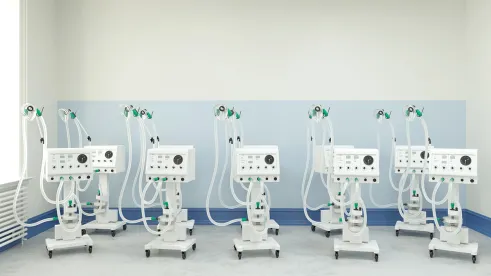On October 7, 2020, Florida’s Fourth District Court of Appeal affirmed a defense verdict in favor of a medical device manufacturer and in doing so approved of the trial court’s use of the risk-utility test and not the consumer expectations test in the jury instructions. Cavanaugh v. Stryker Corp., — So. 2d —, 2020 WL 5937405 (Fla. 4th DCA Oct. 7, 2020). The wrongful death lawsuit was filed against multiple defendants, including the manufacturer of a medical device used to remove blood and clear the surgical field, following the death of a patient during lung removal surgery. The claims against the medical device manufacturer included strict liability design defect, strict liability failure to warn, and negligence.
The plaintiff settled with several health care professionals and only the claims against the manufacturer proceeded to trial. At trial, the plaintiff proposed a jury instruction where the jury could find that the product was unreasonably dangerous if the plaintiff established either the consumer expectations test (which determines liability based on whether the product fails to perform as safely as an ordinary consumer would expect when used as intended or when used in a manner reasonably foreseeable by the manufacturer) or the risk-utility test (which determines liability based on whether the risk of danger in the design outweighs the benefit). The defendant manufacturer, however, proposed that the jury instruction include only the risk-utility test (a product is unreasonably dangerous if the risk of danger in the design outweighs the benefit). The trial court rejected the plaintiff’s proposed instruction and adopted the defendant’s risk-utility instruction.
On appeal, the Fourth District addressed the Florida Supreme Court’s decision in Aubin v. Union Carbide Corp., an asbestos case, where the High Court adopted the consumer expectations test and rejected the “categorical adoption of the Third Restatement and its reasonable alternative design requirement.” Id. at 4 (quoting Aubin, 177 So. 3d at 510). The Fourth District Court of Appeal expressly found that Aubin was distinguishable because it involved asbestos as opposed to a complex medical product which may be “too complex for a logical application of the consumer expectations test.” Id. at 5. The appellate court made the following key findings in reaching its decision to apply the risk-utility test instead of the consumer expectations test:
-
Aubin did not express disagreement with or disapproval of cases recognizing that some products may be too complex for a logical application of the consumer expectations test. Id.
-
Aubin establishes that a plaintiff may elect to prove a design defect claim under the consumer expectations test in any case where an ordinary consumer could form expectations about the product at issue. But Aubin did not decide whether the consumer expectations test can logically be applied to a complex medical device accessible to the consumer only through a medical professional. Id.
-
The consumer expectations test cannot be logically applied where, as here, the product in question is a complex medical device available to an ordinary consumer only as an incident to a medical procedure. Id.
-
Even if some version of the consumer expectations test should apply to complex medical products which are provided to a consumer through a learned intermediary, the Florida pattern jury instructions would need to be modified in order to inform the jury that the relevant expectations are those of the health care professional (citing cases where the surgeon is defined as the consumer). Id. at 6.
-
The plaintiff’s proposed instruction utilizing the consumer expectation test would have been misleading to the jury because it failed to inform the jury that the relevant expectations are those of the medical professional, not the ordinary consumer. Id.
-
The plaintiff’s proposed instruction using the consumer expectation test is also an inaccurate statement of the law under the facts of the case and would have been confusing to the jury. Id.
The opinion in Cavanaugh is very significant, especially for medical device manufacturers, because it is the first appellate court in Florida to clarify that Aubin does not apply when the case involves a complex medical device.




 />i
/>i

